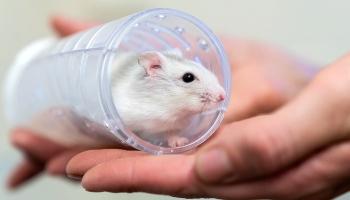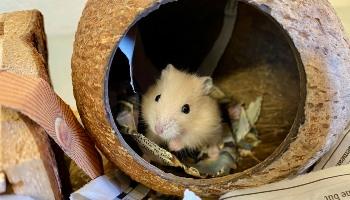Understanding hamster behaviour
Here's a handy checklist of what your pet hamster needs to stay healthy and happy and behave as they would in the wild.

Hamster needs
- To sleep undisturbed during the day.
- Predictable lighting times - keep them in a room where the lights aren't left on until late at night, and where regular hours are kept.
- Plenty of space to play and exercise at night. Wild hamsters are usually only active at dusk and night-time and can run up to five miles a day.
- A running wheel - this will help them exercise, but it shouldn't be the only form of enrichment you give them. Wheels must be good quality with a large diameter, such as one intended for rats. They'll need to be a solid structure and axle-free, and should ideally have a non-slip running surface. As your vet for advice if your hamster develops sore feet while using the wheel and remove it temporarily.
- A deep layer of litter in which they can dig and construct a burrow.
Always supervise your hamster if you let them out of their cage (when they've become tame) to make sure they don't stray or get up to mischief. If you have another pet, such as a dog or cat, make sure your hamster is safe from them. Never leave your hamster out of its cage unattended or overnight.
Handling your hamster
Always handle your hamster carefully and considerately, in a confident but gentle manner. Interact with your hamsters every day, and handle them as often as you can, but respect their sleeping pattern. Hamsters should not be handled when they are resting or sleeping unless absolutely necessary, as they can find this stressful.
It’s best to get into a routine (ideally every day), and not to spend long periods at weekends interacting with hamsters when this doesn’t happen at other times during the week. Make sure that you know how to handle your hamsters correctly, without causing them distress:
- Hamsters should be allowed to investigate your hands in their own time.
- Hamsters should be picked up by cupping the hamster with two hands and then gently opening the hands so that the hamster is sitting on joint palms.
- Always hold your hamster no more than few inches over a stable surface (like a table) as if they fall from a height they can be injured.
Hamster hibernation
Wild hamsters hibernate during the winter but wake up periodically to feed. Keep your hamster warm during the winter, as this will help stop them going into hibernation. While hamsters can hibernate with no issues, some owners have reported concerns.
If your hamster does go into hibernation, make sure they're in a warm (but not too hot) place and they should wake within a short period. Make sure they have plenty of fresh water, fresh food and nesting material, and check them regularly. If you're at all unsure, contact your vet for advice.


